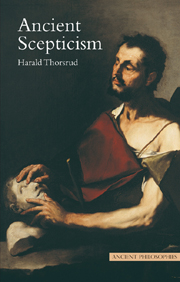Book contents
- Frontmatter
- Contents
- Preface
- Sources and abbreviations
- Chronology
- 1 Introduction
- 2 Pyrrho and Timon: the origin of Pyrrhonian Scepticism
- 3 Arcesilaus: the origin of Academic Scepticism
- 4 Carneades
- 5 Cicero: the end of the sceptical Academy
- 6 Aenesidemus: the Pyrrhonian revival
- 7 Sextus Empiricus: the consistency of Pyrrhonian Scepticism
- 8 Pyrrhonian arguments
- 9 The (ordinary) life of a Pyrrhonist
- Notes
- Guide to further reading
- References
- Index of passages
- Index
8 - Pyrrhonian arguments
- Frontmatter
- Contents
- Preface
- Sources and abbreviations
- Chronology
- 1 Introduction
- 2 Pyrrho and Timon: the origin of Pyrrhonian Scepticism
- 3 Arcesilaus: the origin of Academic Scepticism
- 4 Carneades
- 5 Cicero: the end of the sceptical Academy
- 6 Aenesidemus: the Pyrrhonian revival
- 7 Sextus Empiricus: the consistency of Pyrrhonian Scepticism
- 8 Pyrrhonian arguments
- 9 The (ordinary) life of a Pyrrhonist
- Notes
- Guide to further reading
- References
- Index of passages
- Index
Summary
In this chapter I hope to show that even if we are uninterested in the prospects of tranquillity, Pyrrhonian Scepticism continues to provide an important, and perhaps insurmountable, challenge. For this challenge to take effect, one must simply accept that an arbitrary preference is not a rational basis for belief, and that we have some sort of obligation as rational agents to justify our beliefs. If the sceptic can systematically block all of our attempts at justification, we will be left in the troubling position of believing that we ought to do what we cannot.
The five modes
As we saw in Chapter 6, the modes are the Sceptic's tools; they are argument forms that may be employed against a wide variety of claims. After presenting Aenesidemus' ten modes, Sextus turns to another set of five that he describes as the property of “more recent Sceptics” (PH 1.164; see 1.36).
What all routes to epochē have in common is that they oppose one thing to another (PH 1.31): for example, the appearance that the tower appears round with the appearance that the tower appears square, or the argument that providence exists with the argument that providence does not exist. The only logical requirement is that the opposed propositions must be contraries: they cannot both be true, but they may both be false. As long as they are contraries, there will be a problem for the proponent of either side: he cannot accept that both are true, so he must explain or justify his preference.
- Type
- Chapter
- Information
- Ancient Scepticism , pp. 147 - 172Publisher: Acumen PublishingPrint publication year: 2008



